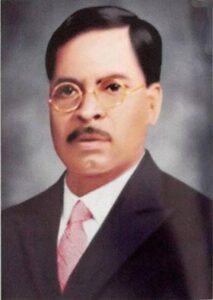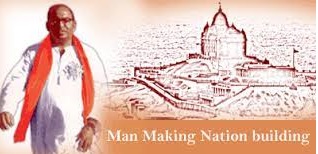
Dr B R Ambedkar is rightfully credited for his efforts and initiatives in championing the cause of social justice and Hindu unity. He truly deserves to be celebrated by all Hindus for his genuine path-breaking initiatives in uplifting the depressed classes, while at the same time ensuring that they do not fall prey to the conversion tactics of Abrahamic religions.
It is heartwarming to note that TN has also produced one such great leader Shri MC Rajah, who championed the cause of depressed classes in a genuine way and infact pioneered the various actions at all India level even before Dr B R Ambedkar took the lead role.
Shri M C Rajah (Mylai Chinna Thambi Raja) was born on June 17, 1883 in Chennai. He did his schooling at Wesley Mission High School, Royapettah and Wesley College. He graduated from Madras Christian College and started his career as a teacher in 1906. He started raising his voices for the depressed classes and took charge as Secretary of the Adi Dravida Mahajan Society in 1916. His focus was on compulsory and free education for the depressed classes. With his profound thoughts and efforts, he came to limelight in a short span. The then Madras Government nominated Rajah to the Primary Education Committee in 1917.
M C Rajah was elected to the Madras Legislative Council from Justice Party during the General Elections held in November 1920. He was chosen as the Deputy Leader of the Justice Party in the house. However, he felt uncomfortable with the hypocrisy of the Justice Party and soon understood that the actions of the Justice Party was totally in contradiction to what they propounded before they came to power. When the Justice Party government introduced reservations for depressed classes in government jobs, they did not include Scheduled Castes in the list as demanded by Rajah. Not only did the Justice Party ignored Rajah’s demand, they also accused him of instigating the Puliyanthope riots. Outraged and disenchanted, Rajah quit the Justice Party in 1923. He was nominated to the Senate of the University of Madras in 1924.
Rajah rose to prominence at All India level. When the All India Depressed Classes Association, headquartered at Nagpur was formed in 1926, he was made the President and Dr B R Ambedkar was Vice President. He was also nominated as the first representative of depressed classes to join the Central Legislative Assembly in 1927 and continued to be its member for 10 years till 1937. Rajah was made a Minister in the provisional cabinet in 1937.
During his tenure as President of All India Depressed Classes Association, he initiated pathbreaking measures to ensure class harmony among Hindus and at the same time raising the voices of depressed classes. As British proposed a separate electorates for Dalits, Rajah signed a pact with Dr B S Moonje, President of Hindu Mahasabha, famously known as Rajah-Moonje Pact (R-MP), in February 1932, whereby he proposed a joint electorate with reservation for Dalits. This served as a severe blow to the British ploy of “Divide and Rule”.
Though initially Dr B R Ambedkar was advocating a separate electorate for Dalits, Rajah convinced Dr B R Ambedkar on having a joint electorate with reservation to ensure that the anti-British forces stay together and fight. Rajah further argued that having joint electorates with reservation for SCs would pave way for a healthy democracy and true social empowerment.
The Rajah-Moonje Pact (R-MP) was infact forerunner to the Ambedkar-Gandhi Pact (A-GP) of Pune six months later the same year. Though most of the clauses of Gandhi-Ambedkar Pact was taken from the Rajah-Moonje Pact, Rajah graciously acknowledged the Ambedkar-Gandhi Pact and welcomed it wholeheartedly in the interest of the nation. In the speech delivered in the Central Legislative Assembly in September 1932, he vehemently supported the A-GP. He was ably supported by Swami Sahajananda, another social reformer and a depressed classes representative.
When Rajah was proposed lucrative offers to get converted to Xtianity and Islam, he outrightly rejected those offers and reiterated his Hindu identity. This is what he has to say to the proselytizers :
“We Depressed Classes, feel ourselves as true Hindus as any Caste Hindu can be. We feel that the moral conscience of the Hindus have been roused to the extent that our salvation lies in bringing about a change from within the main body of Hindu society and not segregating ourselves from them.”
All these go to show that Shri M C Rajah truly served the interests of the Dalits and was genuinely concerned about Hindu unity. He was very careful and particular that none of his actions to voice the concerns of Dalits, give a handle to British to exploit and take advantage. His conviction and commitment to a grand Hindu society, in which people from all classes live with dignity and pride is commendable.
He lived for 60 years and breathed his last on August 21, 1943 in Chennai. The street in which he lived is renamed as “Rajah Street”. The hostel built for the college students of the Dalits in 1944 in Chennai (Saidapet) is also named after him as “M.C.Rajah Memorial Hostel”.
Shri M C Rajah is no doubt a true patriot, genuine advocate of depressed classes and champion of Hindu unity. He is one of the beloved sons of Bharat Mata and will continue to inspire us.

